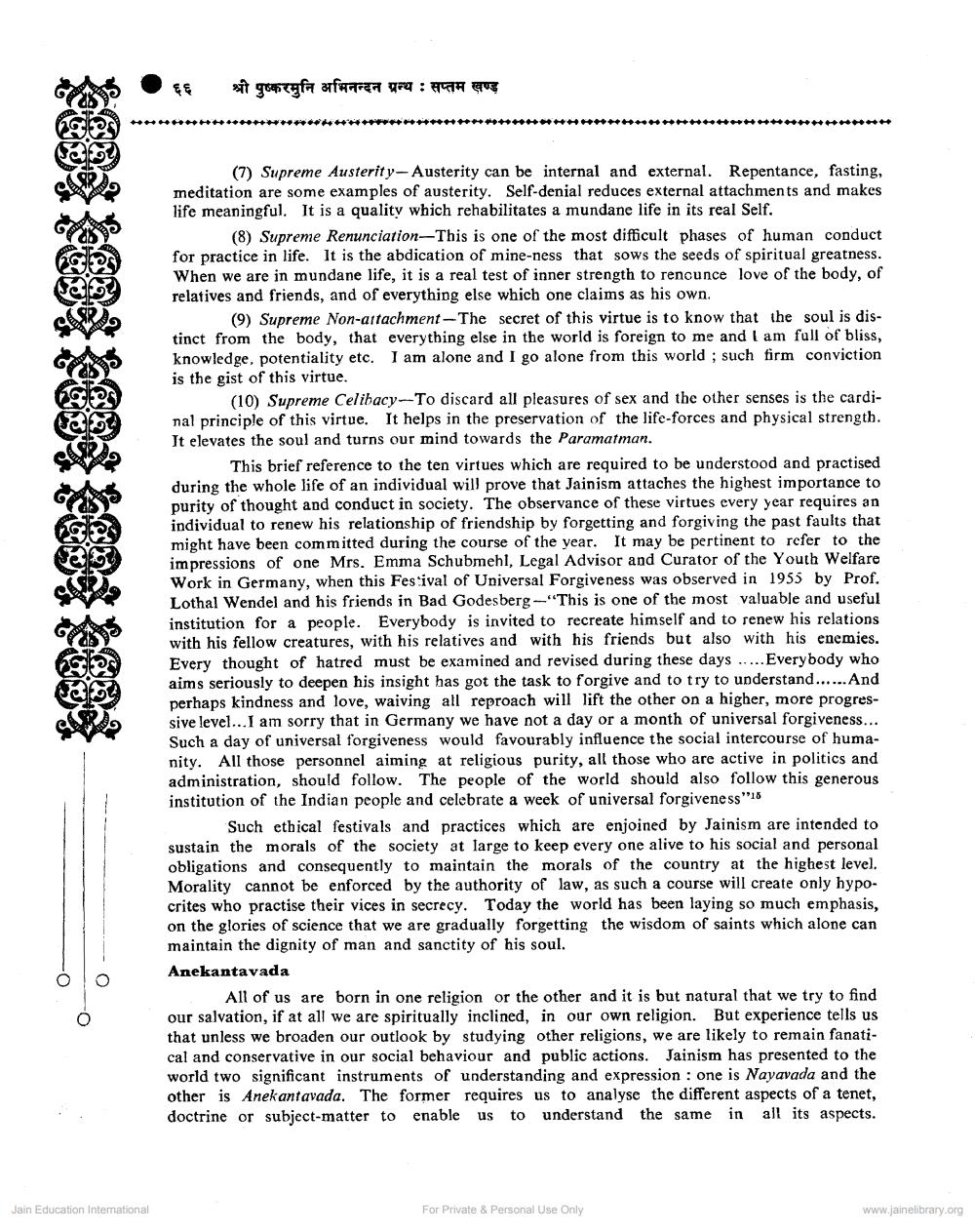________________
.६६
श्री पुष्करमुनि अभिनन्दन ग्रन्थ : सप्तम खण्ड
+++++++
++*
...*.**.***.
.
....*
*+++++++
+++++++++
++
++++
+
+
+
+
+++
+
+
++++
(7) Supreme Austerity-Austerity can be internal and external. Repentance, fasting, meditation are some examples of austerity. Self-denial reduces external attachments and makes life meaningful. It is a quality which rehabilitates a mundane life in its real Self.
(8) Supreme Renunciation--This is one of the most difficult phases of human conduct for practice in life. It is the abdication of mine-ness that sows the seeds of spiritual greatness. When we are in mundane life, it is a real test of inner strength to renounce love of the body, of relatives and friends, and of everything else which one claims as his own.
(9) Supreme Non-attachment - The secret of this virtue is to know that the soul is distinct from the body, that everything else in the world is foreign to me and I am full of bliss, knowledge, potentiality etc. I am alone and I go alone from this world ; such firm conviction is the gist of this virtue.
(10) Supreme Celibacy--To discard all pleasures of sex and the other senses is the cardinal principle of this virtue. It helps in the preservation of the life-forces and physical strength. It elevates the soul and turns our mind towards the Paramatman.
This brief reference to the ten virtues which are required to be understood and practised during the whole life of an individual will prove that Jainism attaches the highest importance to purity of thought and conduct in society. The observance of these virtues every year requires an individual to renew his relationship of friendship by forgetting and forgiving the past faults that might have been committed during the course of the year. It may be pertinent to refer to the impressions of one Mrs. Emma Schubmehl, Legal Advisor and Curator of the Youth Welfare Work in Germany, when this Festival of Universal Forgiveness was observed in 1955 by Prof. Lothal Wendel and his friends in Bad Godesberg - "This is one of the most valuable and useful institution for a people. Everybody is invited to recreate himself and to renew his relations with his fellow creatures, with his relatives and with his friends but also with his enemies. Every thought of hatred must be examined and revised during these days .....Everybody who aims seriously to deepen his insight has got the task to forgive and to try to understand...... And perhaps kindness and love, waiving all reproach will lift the other on a higher, more progressive level...I am sorry that in Germany we have not a day or a month of universal forgiveness... Such a day of universal forgiveness would favourably influence the social intercourse of humanity. All those personnel aiming at religious purity, all those who are active in politics and administration, should follow. The people of the world should also follow this generous institution of the Indian people and celebrate a week of universal forgiveness"18
Such ethical festivals and practices which are enjoined by Jainism are intended to sustain the morals of the society at large to keep every one alive to his social and personal obligations and consequently to maintain the morals of the country at the highest level. Morality cannot be enforced by the authority of law, as such a course will create only hypocrites who practise their vices in secrecy. Today the world has been laying so much emphasis, on the glories of science that we are gradually forgetting the wisdom of saints which alone can maintain the dignity of man and sanctity of his soul. Anekantavada
All of us are born in one religion or the other and it is but natural that we try to find our salvation, if at all we are spiritually inclined, in our own religion. But experience tells us that unless we broaden our outlook by studying other religions, we are likely to remain fanatical and conservative in our social behaviour and public actions. Jainism has presented to the world two significant instruments of understanding and expression: one is Nayavada and the other is Anekantavada. The former requires us to analyse the different aspects of a tenet, doctrine or subject-matter to enable us to understand the same in all its aspects.
O
Jain Education International
For Private & Personal Use Only
www.jainelibrary.org




